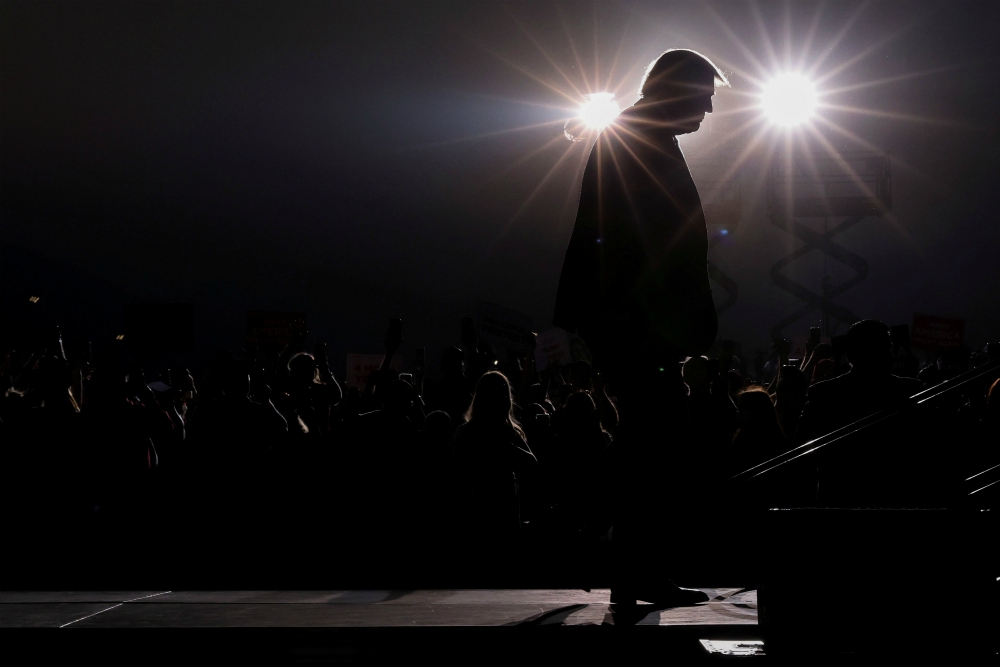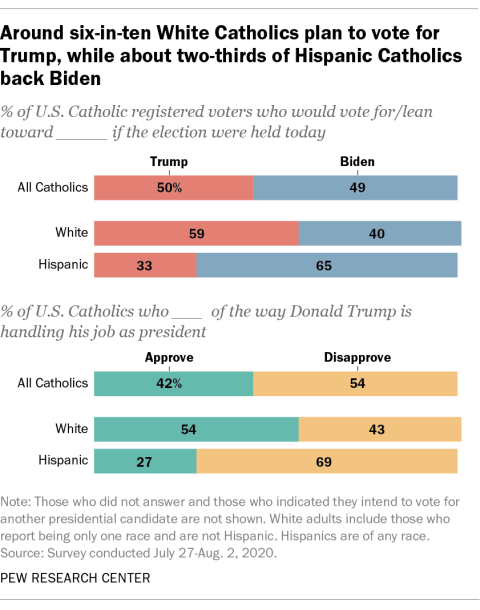
President Donald Trump is seen at a campaign rally in Reno, Nevada, Sept. 12. (CNS/Reuters/Jonathan Ernst)
The news that CatholicVote.org, a Republican group trying to get President Donald Trump reelected, is commencing a $9.7 million campaign to identify Catholic voters in swing states certainly made many of us who police the estuary where politics and religion meet sit up in our chairs.
That news was followed by the more bizarre — and perhaps more desperate? — news that Trey Trainor, the Trump-appointed chairman of the Federal Election Commission had sat for an interview with Michael Voris at Church Militant. And not just an interview. Trainor seemed to fit right into the conspiratorial, fringy, Archbishop-Carlo-Maria-Viganò-loving and Vatican-II-hating climate at Church Militant.
Trainor warned that electing Joe Biden constituted an "existential threat" to the Catholic Church and — apparently ignorant of canon law and the theology of the sacrament of holy orders — asserted that priests should defy their bishop if the bishop orders them to stay away from partisanship in the pulpit.
What is going on? A survey conducted by the Pew Research Center in late July to early August indicated that 50% of all Catholics plan to vote for Trump while 49% plan to vote for Biden. Trump's approval rating among all Catholics stands at only 42% and his disapproval rate is at 54%. That means that 8% of the electorate does not approve of Trump's performance but still plans to vote for him over Biden. They are his "soft" supporters.
Those numbers are more or less in line with FiveThirtyEight's Trump-Biden matchup and approval rating numbers for the entire electorate, with slightly fewer "soft" supporters of the president in the general electorate than among Catholics.
A recent Quinnipiac poll indicated that only 3% of likely voters have not made up their minds about whom to support in November. The national conventions did not move the needle one way or another. And so, the campaigns have recognized that there is not a lot of persuading to do between now and election day. They need to make sure their supporters vote and, what is more, see if there is any low-hanging fruit among unregistered citizens or registered but nonvoting citizens whom they can shake out of their electoral lethargy and get to the polls.
Back in January, Heidi Schlumpf reported on efforts by CatholicVote.org to use the technology of geofencing to identify churchgoing Catholics, compare that list with voter registration lists, and try to get those churchgoing Catholics to register and vote. Polls have shown for years that people who attend church weekly or more often tend to be more conservative and more Republican than those who attend church less frequently.
Then along came COVID-19, and geofencing became impossible in the spring when no one was going to public Mass. I suspect that sending an administration official to go talk with Church Militant is an effort to reach out to any of those frequent Mass attenders who, for whatever reason, are not registered.
How many are there? No one knows. CatholicVote.org claimed that at least half of the 200,000 Catholics who attended Mass at least three times in 90 days were not registered when Schlumpf reported on their efforts at the beginning of the year. I have a hard time believing that a Church Militant viewer who buys into all that nonsense is not registered to vote already or, if not, can be persuaded to do so unless Our Lady of Fatima delivered a fourth secret to Viganò.
Here is the problem for the Trump campaign. Yes, he needs to motivate his base. He also needs to avoid giving reasons to stay home and not vote to his "soft" supporters, the 4% or 5% who do not approve of his job performance but tell pollsters they plan to vote for him over Biden. He needs their votes, too, and cozying up to cranks like Church Militant tends to turn off those more moderate voters.
The campaign may have concluded that it was a risk worth taking because Church Militant reaches a pretty self-contained audience. But The Washington Post noticed the interview. And who knows who else?
Advertisement
By way of comparison, Team Biden did not hand a microphone to the head of NARAL Pro-Choice America, Ilyse Hogue, during four nights of national convention or any other person whose views would appear out of the ordinary to an ordinary American. Biden keeps his extreme supporters at arm's length while Trump doubles down on his. NB: Being a bit more to the extreme left on economic issues, as opposed to social issues, is actually very popular with centrist voters and Biden should do more of that.
Trump needs nominal voters who identify as religious to believe the nonsense Trainor spouted. They need to convince people that Biden is "against God," as the president has claimed, if he is to succeed at shaking more voters from the religiously zealous tree. Despite the daily increase in the death toll from COVID-19, they need people to believe that Trump is "the most pro-life president in history."
The Trump team thinks that only the Manichaean separation of the world into the forces of evil and the forces of good will convince enough people to give him a second term.
The Trump campaign should be worried. Cardinal Joseph Tobin of Newark, New Jersey, is not a Manichaean, but a pastor. He issued a statement the same day reiterating what he had said on a webinar on Tuesday, namely, that Catholic voters must discern for whom to vote and that they could, in good conscience, vote for Biden or for Trump. Yesterday, Chicago Cardinal Blase Cupich issued a statement making it clear that the forthcoming National Catholic Prayer Breakfast, at which Attorney General William Barr will be honored, is not a church-sanctioned event.
The U.S. bishops' conference even issued a rare statement regarding the revocation of Temporary Protected Status to 200,000 immigrants in which it criticized the Trump administration by name.
It is depressing — and will warrant a future column — to reflect on the fact that Trump thinks his best chance at a second term runs through the Catholic Church and that someone is willing to spend $9.7 million to test the proposition. The good news is he may be in for a surprise. The Catholic Church has not survived 2,000 years by catering to its extremist elements and Trump may be alienating the very voters he needs to win.
[Michael Sean Winters covers the nexus of religion and politics for NCR.]
Editor's note: Don't miss out on Michael Sean Winters' latest. Sign up and we'll let you know when he publishes new Distinctly Catholic columns.






